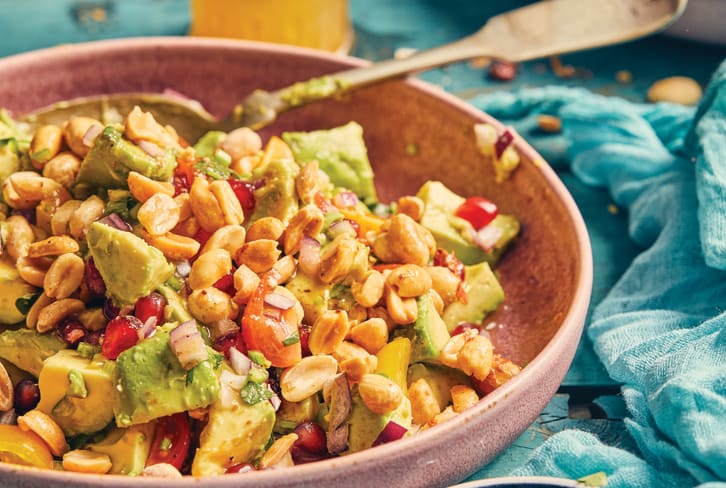I don’t really have this. I do have about a million mistakes made, but almost all of those mistakes I probably needed to make myself in order to really learn how to avoid them in the future. Does that make sense?
It has been estimated that each year, more than 100 billion pounds of food is wasted in the United States. That equates to more than 160 billion dollars worth of food thrown away each year. At the same time, in many parts of the United States, there is a crisis caused by people having limited access to healthy & affordable food options. The waste of food is not only a waste of money and bad for the environment, but it is also making vulnerable populations even more vulnerable.
Authority Magazine started a new series called “How Restaurants, Grocery Stores, Supermarkets, Hospitality Companies and Food Companies Are Helping To Eliminate Food Waste.” In this interview series, we are talking to leaders and principals of Restaurants, Grocery Stores, Supermarkets, Hospitality Companies, Food Companies, and any business or nonprofit that is helping to eliminate food waste, about the initiatives they are taking to eliminate or reduce food waste.
As a part of this series, I had the pleasure of interviewing Robert Mock.
Robert Mock is the CEO of Ocean’s Halo, a fast-growing, Asian-inspired line of foods that include soups, noodles, seaweed snacks and more. When he moved from Texas to California, he discovered seaweed and became passionate about the health of our oceans. He left his job in the banking industry to launch Ocean’s Halo.
Thank you so much for joining us in this interview series!1. Before we dive in, our readers would love to “get to know you” a bit better. Can you tell us a story about what brought you to this specific career path?
My family moved from Texas to California during the financial crisis of 2008, while I was in banking. It was then that my family was introduced to seaweed as a healthy snack. I left banking about 5 years later and embarked on a journey to build a healthy food brand based on the taste, nutrition and sustainability of seaweed.
Can you share the most interesting story that happened to you since you began at your company or organization?
We began with a big idea, which was a new to the world — a “frito-style” seaweed chip. That chip was incredibly difficult to produce with consistent quality and crunch, yet we plowed all our energy, funding and efforts to make it the next big snack success. After only 18 months on the shelf, we had a national FDA recall for gluten contamination, and our chips were kicked out of every retailer including Starbucks, Target and Whole Foods. We could have thrown in the towel, in fact, my co-founder left after that. Yet five of us decided to hit the reset button and try again with a different approach, and from there we based all our innovation on consumer data. This was back in 2015, and it was after this pivot that Ocean’s Halo as a healthy brand really began to take off and be successful with retailers and consumers.
How do you define “Leadership”? Can you explain what you mean or give an example?
I am not sure I have a great definition for leadership; however, I can say that we have an unwritten policy on our team. No whining, bring ideas or ask for help. This is because when you start a company from scratch, you have both minor and major problems happening every single day — so complaining and not working to solve them is simply a dead end approach as an entrepreneur. This policy works. Maybe it is related to leadership in some way, maybe not, but this has been a key to our success.
Can you please give us your favorite “Life Lesson Quote”? Can you share how that was relevant to you in your life?
The truth will set you free. From personal to business, this rule in life keeps everything simple for me, period.
Let’s now shift to the main focus of our interview. Let’s begin with a basic definition of terms so that all of us are on the same page. What exactly do you think we are talking about when we refer to food waste?
We think about food waste in two major ways as a shelf stable, retail brand. The first is how do we, as a food manufacturer, ensure that the highest % of our delicious products are enjoyed and actually consumed. Our focus for this part is eliminating waste at our production and roasting facilities, which for the most part we have been very successful with. Any food waste at our production facility is donated to local farmers as high protein animal food. The more challenging part is producing to meet demand. We are not always perfect with this, yet we have incredible partners like Second Harvest Food Bank of Silicon Valley and Conscious Alliance which ensures any product not sold at retail can be donated to feed the hungry at a local level. Second, we think about food waste in terms of packaging… this means excess packaging, non-recyclable packaging, and non-compostable packaging. For this we are excited to get the word out about removing the plastic tray in our #1 sku, which might only be 15 million plastic trays for our brand today, but as this sustainable packaging move takes hold across our category and industry, it will eliminate 2 billion plastic trays per year!
What are a few of the obstacles that companies and organizations face when it comes to distributing extra or excess food? What can be done to overcome those barriers?
It took us a couple years to find the right food bank partners that execute efficiently to help distribute our excess products directly to consumers in need. For the last few years, the partners we work with have been very successful.
Are there three things the community/society/politicians can do to help address the root of this problem?
We proudly promote our cause and mission partnership with 1% for the Planet on the front packaging of our products, and it is organizations in our community and nationally like this which advocate successfully to consumers and retailers alike for more sustainable food practices.
What are your “5 things I wish someone told me when I first started” and why. Please share a story or example for each.
I don’t really have this. I do have about a million mistakes made, but almost all of those mistakes I probably needed to make myself in order to really learn how to avoid them in the future. Does that make sense?
Are there other leaders or organizations you think have done good work to address food waste? Can you tell us what they have done? What specifically impresses you about their work?
(see above for Second Harvest Food Bank of SV, and Conscious Alliance) — you can simply see their weekly posts of them in action feeding the hungry. We also participate in Feeding America, which is a cash donation annually based on products sold (this is a well known organization nationally)
If you could inspire a movement that would bring the most amount of good to the most amount of people, what would that be? You never know what your idea can trigger. 🙂
I do like the song “Can’t we all just get along”, that would be a great movement. As for food, we have some great movements that we get behind now as much as we can as a small company and growing food brand like 1% for the Planet. We use our packaging as the messenger, which is awesome.
Is there a person in the world, or in the US with whom you would love to have a private breakfast or lunch, and why? He or she might just see this, especially if we tag them. 🙂
I would rather like to buy breakfast for any veteran or current soldier in the US armed forces to thank them for what they do for our country every day of their lives which make our lives and freedom possible.
This was very meaningful, thank you so much, and we wish you only continued success.







